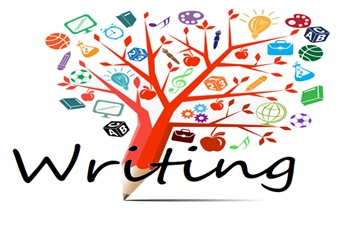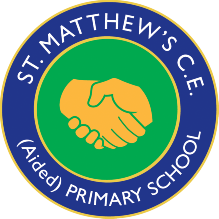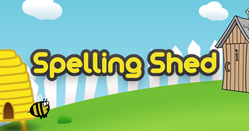
"Every child is a born writer... If you don't see the book you want on the shelves , write it"
Beverly Cleary (Author)
Our Vision for Writing
Intent
Writing plays a significant role in society and in education as it is a fundamental life skill. Being able to write with conviction and accuracy, is a tool that will support our pupils in the wider world. It is our intent that our children comprehend the social functions of writing so they can choose the appropriate genre when writing for a particular audience and purpose. We have high expectations of all children, and encourage pupils to challenge themselves, persevere and strive to reach their full potential.
At St Matthew’s Primary School, we believe that a comprehensive English curriculum should foster students' love of reading, writing, and spoken language to ensure that they are given the skills to express themselves confidently verbally and in writing.
Our writing curriculum intent strives for pupils to acquire a broad vocabulary, a firm grasp of grammar, and the ability to spell new words by effectively putting the spelling patterns and principles they have learnt into practice. We believe pupils should be given the knowledge and skills to write concisely, precisely, and coherently while modifying their language and style to suit a variety of different purposes, contexts and genres.
It is important to us that pupils are supported to take pride in the presentation of their writing, this by developing a fluent, joined and efficient handwriting style by the time they reach upper Key Stage 2. We intend for pupils to leave primary school being able to use fluent, legible and speedy handwriting, even when writing at length.
Through our teaching of writing, we intend to impart pupils with the knowledge, understanding and skills they need in order to reach their potential as individuals and authors of the future.
It is our intent that every child develops a progressive understanding of grammatical conventions, the way in which punctuation aids understanding and how to apply spelling rules.
We want all of our pupils to leave primary education being able to independently plan, revise and evaluate their writing; to be able to do this effectively, pupils focus on developing effective transcription and effective composition to ensure their writing is presented in the most meaningful, effective, and grammatically accurate manner.
Through each writing cycle or activity completed, pupils will develop an awareness of the audience, purpose and context, and an increasingly wide knowledge of vocabulary and grammar.
Our aim is to provide inclusive and aspirational environments and learning experiences where pupils thrive and build the cultural capital they need to make aspirational choices about their own futures, overcoming any barriers.
Implementation
Early writing is taught through early mark making and when the children use Read, Write, Inc phonics, they are taught letter formation and fine motor skills. This begins with writing (whether with a writing tool or in the air) cvc words, moving onto short sentences using the sounds they have been taught. The children also learn to remember and write stories using The Read, Write Inc ‘Get writing and Fred talk’ for writing’ approach. They are encouraged to write independently in continuous provision, which immerses the children in writing through a thematic approach. This process continues into Year 1, where children are inspired to use the sounds taught in their independent writing. They have access to supportive Read Write speed sound charts and sound mats, whenever they are writing, to support them in their independent application whether this is with the teacher, in continuous provision or independently.
The core of our writing curriculum is the National Curriculum for England, which is supported by Read, Write, Inc phonics and spelling schemes. Read, Write Inc, which supports our English curriculum, is a systematic, synthetic phonics scheme that is validated by the Department for Education. This foundation ensures that pupils can apply the phonics skills required for them to become confident writers.
At St Matthew's we:
- Use a variety of approaches to support delivery of the writing curriculum across the school which are researched by our subject leader who provides regular CPD for staff.
- Implement a consistent and systematic approach to writing from Years 2-6, employing clear processes for drafting, editing and innovating to a range of non-fiction, fiction and poetry genres.
- Teach a curriculum that is designed and delivered in a way that allows pupils to know more and remember more. Key concepts are embedded in their long-term memory so they can apply them fluently when writing independently.
- Review children’s prior and previous knowledge throughout the writing cycle, and analyse and compose model texts and exemplary examples in terms of organisation, composition, vocabulary and grammar in the given text type.
- Use modelled writing to reflect the age-related expectations for each specific year group.
- Teach pupils to deconstruct model texts identifying the key features and discuss, at length, the purpose of each skill in relation to the text type and the intended audience.
- Check pupils understanding effectively, address any misconceptions promptly and encourage pupils to edit their own work using a purple pen.
- Implement our long-term English plan to ensure that all genres are mapped out across each year group.
- Use high quality texts, linked to our cross curricular units, to model the language, vocabulary, structure, punctuation and grammar that we expect our pupils to independently apply in their own speaking and writing.
- Use our progression document carefully to plan for progression in genres and toolkits such as setting, tension and characterisation.
- Link our writing context to our cross curricular units, finding real life reasons and a purpose for children’s writing.
- Produce genres of writing that run alongside the learning taking place in our reading lessons so that children are fully immersed in the text type.
As writers, our children develop writing as a transferrable skill across all subjects taught in the curriculum. Therefore, our children are immersed in History/Geography/Science related topics for their writing as often as possible and encourage cross-curricular links. Our aim is to provide engaging writing hooks that are linked to each half termly topic to give children an audience and purpose for writing. Children are expected to transfer their key topic knowledge and vocabulary into their writing and vice versa to transfer their spelling, grammar, and punctuation knowledge into their written work.
Impact
After the teaching of a unit, teachers assess pupils’ independent writing and set targets to assess understanding and evidence progress across a range of genres. Teachers use the writing assessment framework materials to assess writing at the end of each unit/genre to track pupil progress and identify areas of need. This not only informs them of pupil progress but informs the mapping of future genres to ensure pupils have sufficient opportunities to demonstrate the skills expected of them.
We measure the impact of our curriculum through the following methods:
- Formative assessment that takes place daily, while twice half-termly summative assessment takes place in the form of independent writing assessments which identify where pupils can apply skills independently.
- Moderation across year groups, cross-phases and in cluster moderations to develop their professional understanding of the assessment of writing, draw ideas and support from colleagues and celebrate significant progress made.
- Termly assessments focused on spelling, grammar, and punctuation knowledge (RWI Spelling and NTS reading/grammar tests).
- Analysis of assessment data that is reflected upon in pupil progress meetings to identify areas of development and any children who are not making expected progress.
- Regular monitoring conducted by the subject leader and senior leadership team. Monitoring follows the five-strands approach and includes: regular book looks, lesson observations and learning walks, gathering evidence of good practice, pupil voice interviews, looking at data submitted on Sonar Tracker.
- Additional support that is provided through intervention and booster sessions focused on spelling, handwriting and composition.
Our pupils know that writing is a vital life skill that they will rely on in daily life and in the wider world. The impact of our curriculum is that pupils are:
- prepared for the next stage of education and life in modern Britain.
- can write successfully for a range of purposes and audiences.
- able to apply spelling patterns.
- write legibly with a consistent handwriting style.
- able to identify and use grammatical structures along with effective vocabulary.
Children at St Matthew's can access spelling practise by logging onto our Spelling platform Ed Shed below.
| Click on image above |

